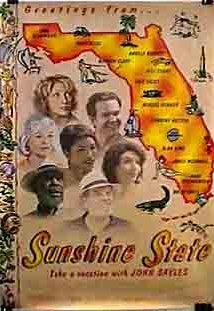“Nature on a Leash”

| None | Light | Moderate | Heavy | |
|---|---|---|---|---|
| Language | ||||
| Violence | ||||
| Sex | ||||
| Nudity |
What You Need To Know:
SUNSHINE STATE is provocative and entertaining enough to merit a second viewing. All of the actors are marvelous, so it’s hard to pick out just one. Regrettably, although the movie has positive Christian content with some moral elements, including a nice church scene, it also contains many problematic worldview elements. For example, there’s an undercurrent of anti-capitalist, environmentalist satire in the movie, plus a lax attitude toward premarital sex. The only things that save SUNSHINE STATE from being a mere political diatribe are its flawed and contradictory, but fascinating, characters and the affection that Sayles displays for his setting. In all, Sayles manages to be provocative rather than really offensive.
Content:
(PaPa, EE, ACapACap, PCPC, CC, B, Co, H, LL, V, S, N, A, D, M) Eclectic pagan worldview with some pagan, environmentalist, anti-capitalist, Christian, redemptive, moral, anti-capitalist, Communist, and humanist worldview elements and content; 27 obscenities including one “f” word, one strong profanity and four mild profanities; man tries to kill himself several times but is always interrupted; implied fornication with couples lying in bed or getting dressed afterwards; upper male nudity; alcohol use; smoking; and, lying, corruption, gambling, and attempted suicides.
More Detail:
Change is coming to Delrona Beach, Florida. Marly is busy running her sickly father’s motel, which she hates, and trying to decide whether to sell out to the rich developers who have assaulted the town. Her mother is living in her own dream world down at the community theater. Marly is also drawn to the new guy in town, a handsome divorced architect who works for one of the developers.
Meanwhile, Desiree is a newly married black woman who’s back home for the first time in 25 years. She’s home to show off her new husband, a doctor, but she doesn’t trust her mother Eunice, who’s taking care of an orphaned teenage relative, Terrell. Terrell’s father murdered his mother, and Terrell is now having problems with the law because of his penchant for arson. Eunice lives in the black enclave of Delrona.
Finally, Chamber of Commerce leader Francine is once again in charge of the town’s Buccaneer Days celebration. She’s too busy to see much of her banker husband, whose gambling debts are making him suicidal.
Interwoven among these stories are scenes with comedian Alan King leading a group of elderly hackers in a round of golf. King waxes eloquently on the impact of the white settlers on the Native Americans and black slaves, as well as Florida’s penchant for trying to lasso nature. “Nature on a leash,” he calls it.
SUNSHINE STATE is a complex movie that’s well worth a second viewing. All of the actors are marvelous, so it’s hard to pick out just one. Regrettably, although the movie has positive Christian content with some moral elements, including a nice church scene, it also contains many problematic worldview elements. For example, there’s an undercurrent of anti-capitalist, environmentalist satire in the movie. The only things that save SUNSHINE STATE from being a mere political diatribe are its flawed and contradictory, but fascinating, characters and the affection that Sayles displays for his setting. In the end, Sayles manages to be provocative rather than really offensive.


 - Content:
- Content: 




